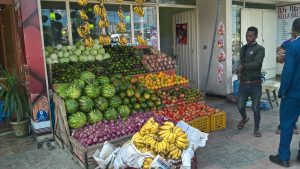There is substantial concern that global food insecurity is increasing as a result of the COVID-19 pandemic. Organizations such as the UN Food and Agriculture Organization (FAO), World Food Programme (WFP), and CGIAR are trying to get a clear picture of the growing challenges people may be facing, but the nature of the pandemic makes data on food security and daily living challenging to obtain. Because face-to-face surveys have largely not been possible during the pandemic, much of what we know about actual changes in food security status is coming from phone surveys. These surveys suggest large proportions of respondents are facing falling incomes; the World Bank reports declines in incomes and food security where they have conducted phone surveys.
These reported income changes suggest the pandemic has affected a large proportion of the world’s population and that the poor in particular face the threat of significant food insecurity. However, phone surveys typically do not allow us to quantify respondents’ changes in income. In other words, we know they perceive their incomes decline, but we do not know how much they have actually declined. As a result, analysts must make assumptions about the severity of income changes.
A series of surveys we have been conducting in Addis Ababa, Ethiopia suggests there may be reason to be cautious about such assumptions. While a majority of people have reported lower incomes in recent months, overall food consumption in our most recent survey (conducted in early August) was comparable to pre-pandemic levels, though with shifts in dietary composition. These results, detailed in our new discussion paper, indicate that it is easy to read too much into survey questions regarding subjective changes in incomes in the pandemic, and also that many food value chains in Ethiopia have continued to function relatively well in the crisis.
To understand how information on income changes corresponds to changes in food consumption, we have tracked a panel of households in Addis Ababa since 2019. Panel households were initially surveyed in person about their food consumption in Aug. and Sept. 2019, and were tracked through the COVID-19 pandemic through phone surveys in May, June, and July 2020. The Aug. 2020 food consumption survey allows us to directly compare consumption during the pandemic with consumption at the same time of year in 2019, six months before the pandemic began in Ethiopia.
Collectively, the surveys suggest that even if incomes have declined among a majority of the city population, the value of food consumption has not. The Aug. survey this year found that overall food consumption was similar to pre-pandemic levels. The distributions of values are nearly on top of one another, suggesting the food budget is about the same among households across income groups—even among poorer households. Moreover, we do not find a decline in food consumption among households that had reported an income decline or a lost job in the previous (July) phone survey, implying that the subjective question about an income loss does not predict changes in food security levels.
Click Here to read full findings



